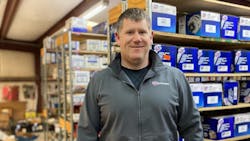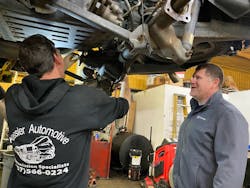Editor's note: This article originally appeared in Ratchet+Wrench, a sister publication in the Endeavor Business Media Vehicle Repair Group.
The sun isn’t up long before Trey Magee cracks open the doors at his Carquest Auto Parts store in Toano, Virginia. His family has been in the auto parts business for 42 years — since 1981 — when Magee’s grandfather purchased his first Carquest location. His father would eventually join the business a decade later. Today, Magee has created tremendous success for himself and his team within this same business—one he never intended to join.
Before taking over the store, Magee worked in law enforcement in Washington, D.C. But a chat one day with his father caused him to reconsider the direction of his career. His father explained that Advance Auto Parts was opening the door for them to acquire more stores, and he was in a unique position to step into the business and scale it up as large as he wanted.
“(My dad) said, I can't do it. I have no desire to do it. I don't want to do it. So, if you're happy being a cop, you stay up there and be a cop and do your thing. No harm, no foul, but if you have any interest at all, come down and listen to (them) and hear them out,” Magee says.
According to Magee, Advance sold him on the dream that day, and he left law enforcement behind to build the family auto parts store. Today, the family has three stores in Virginia — Wakefield, Waverly and Toano — and Magee hopes to have a dozen or so more in the future.
“I hope we have 10, maybe more. I don't know, but I don't want to stop. These opportunities weren’t there for grandpa and my dad,” Magee says.
Understanding the needs of independent repair shops
Parts shortages have been a recurring storyline in the automotive aftermarket over the past three years. This shortage has left some auto repair shops in a lurch when it comes to rapidly sourcing auto parts. It's a situation Magee is aware of, and one he works hard to help solve for his customers. As the shop gets calls for parts, he's able to supply them from his store, but when he cannot, he’s able to tap into a large network of parts distribution centers in and around his immediate area.
“There are just tons of options for getting parts, so it's utilizing the networks that we have. We have a lot of networks and Advance and Carquest have millions of dollars' worth of inventory that aren't in any one particular location of ours to sell but within a couple of hours. We can get it,” Magee says.
He says as a parts shop owner, he’s responsible for taking the initiative to know and understand the needs of each of his customers, what they frequently order and the availability of each part. With this information, he and his team can forecast what inventory he needs to have on hand for each customer.
“There are trends of what they buy and the things they use,” Magee says. “We sit down, and we have discussions and forecast, ‘This is what I've been using over this amount of time. Well, it's not available today. Alright, guys, we need to keep our eye on this inventory when it comes available.’ I will have all those things in the store when (they) need them next. Our philosophy is if you're willing to buy it, I'm willing to keep it. I'm willing to stock it—doesn't matter what it is.”
Communication equals trust and reliability
Magee says good communication is the catalyst for building trust between the parts store and independent repair shops. The shops need to know they can depend on the parts store to come through, in the clutch when necessary, and the parts store wants to be the trusted partner the repair shop can count on.
Victory Automotive, one of the newer shops in Magee’s service area, is one such customer. As a new shop, they need to develop trust with their customers immediately. Having an auto parts store that’s reliable makes that possible. Aaron Chadwick, the shop’s owner, has sourced parts from Magee since his shop opened two years ago.
"I've known them for a while because I worked at a local (shop) before. As soon as I opened up my own business … I stuck with them. The drivers are great. You can't ask for better people,” Chadwick says.
Chadwick says his shop’s efficiency also depends on the availability and speed of sourcing parts.
"When it comes to parts, that's half the battle. If you can't get a car part quickly, you're wasting money, you're wasting time—cars are on a lift and (you’re waiting on) a part. Then lifts are not being used to make more money," Chadwick says.
Magee adds that one way he supports shops like Victory Automotive is having his driver stock oil and filters on shelves regularly to make them readily available for the technicians, so the parts are an arm's length away rather than a phone call away.
Hunter McClendon, a technician at Victory Automotive, says the relationship they have with Carquest is an important one.
"We got to have parts to fix vehicles. So, it's a team effort. If we don't have good quality parts, we can't serve our customers. So, when you call, you're talking to somebody there,” McMlendon says. “We have a good relationship.”
Service first
At the end of the day, Magee feels like he's in the right career. He’s learned over time how to allow the people on his team to take leadership within their positions. That translated into customer service people developing relationships with regular do-it-yourself customers from the counter and parts drivers making meaningful connections with auto repair shops—a must for mutual success. A little bit of wisdom from his father was the catalyst for that change. If Magee was going to build something bigger than his predecessors, he needed to do what they didn’t.
“He said, 'Son, you'll never be the man if you are the man. I've spent all my life in the store at Wakefield. If that phone rang, they wanted to speak to me.’ He said, ‘If you create an environment where when the phone rings, you're the only person that they want to speak to how are you ever truly going to grow this into something special?'"




